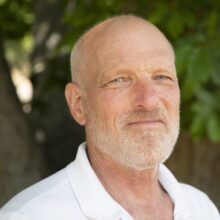How can the Dhamma and my meditation practice support me in the actualities of this life, so fragile and vulnerable? As much as the Buddha’s teachings point to the importance of being awake here and now, the missing piece for many of us may be something different: plan ahead.
Isn’t that what practice is about, an irrational mix of present moment awareness and cultivating qualities for a wholesome future, one with less chaos and unnecessary suffering? And what bigger events are there to “plan for” than those put forward in the Buddha’s major teaching on the five topics for reflection: (1) aging, (2) illness, (3) death, (4) that I will be separated from all that is dear to me, and (5) that I am the heir of my kamma, my actions? Taken to heart, these powerful reflections will arouse some strength in our commitment to a wise and wholesome life. But for this to happen, it must feel real.
Can you feel the urgency of illness and death right now? If not, don’t wait! Contemplate now, while you have some degree of strength, while you have some degree of clarity, while you have some time where you are pain free to sit there and reflect. It’s not skillful to wait until your world collapses. In the moment that you are dying, reaping the results of your action, or plagued with illness, it’s not so easy to calmly reflect, right? When someone that you deeply love is ill or dying, do you just in that moment start the work?
Of course not. Start the work now, now. For the benefit of yourself and the beings around you, start the work now.
Samvega is spiritual urgency for wakefulness that comes from genuine reflection, like from being intimate with the reflections of aging, illness and death. What is the quality of seeing clearly the actualities of your fragile life, the actualities that we will be separated from all that is loved and dear to us? How fully can we realize that every action we take nests fully into our lives? The answer is simple: practice.
Like one remembers to bring attention to the breath or the mind, we remember the reflection. We remember the object and its purpose. Our practice may include formal sitting, where we think about all the elements of aging, illness or the other reflections, like its inevitability, what it might actually look like for us, how it might feel, and so on.
Or it might be an informal practice, where we hold death over our shoulder as we live our ordinary days. With consistent practice, the perspective born of these reflections becomes imbued into our lives.
We may sometimes notice a tendency to frantic urgency. But living regularly with these reflections, we naturally begin to release the frantic urgency and drop beneath the fear.
Yes, this is urgent; yes, it matters, but we have a way to approach this. Knowing there is a way through this human dilemma brings forth the quality of pasada, cool confidence in the path. We gradually become established in the collected quality of mind that comes with knowing where we are headed.
The path we are headed on has two key elements: the life of active compassion and the way of living and practices that lead to the understanding that in the here and now, there is no ageing and death, only the flux of experience. When insight is gifted, we may open to the possibility of what the Buddha called the deathless.
Both aspects of this path—establishment in compassion and the living understanding of the deathless—call us to release our self-centered orientation towards life. This is not easy and cannot be done alone. In fact, this path is not possible to undertake alone. We need from each other the power of reminding, the respite of love, and the amplifying power of relationship to see clearly. This is refuge in the Sangha. Opening out through wise relations, we can be supported and be joined in the samvega and pasada.
Wholesome urgency comes with remembering, reminding each other: let’s not waste any time because this life is too precious. Wholesome cooling and confidence, as part of an interpersonal path, is a mutual down regulating and sustenance of faith in the path.
Drop by drop these reflections benefit the body mind. The totality of our practice is our lives. Are we headed towards a stupid life or a wise one, an ignorant death or a wakeful one? There is a choice.
I invite us into this sense of these reflections of doing the good work, doing so in the tenderness of the shared human experience.

